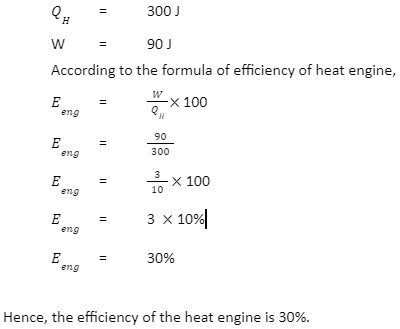Machines that are used to do useful work by converting heat into mechanical energy are known as Heat engines. These heat engines receive heat from the ignition of fuel, coal, petrol, or other energy sources. There are three parts of heat engines – source, or hot reservoir, the working body, and cooler or sink or cold reservoir.
Heat Engines
Heat engines are the mechanisms that convert heat energy into thermal energy and then turn it into mechanical energy to do work. Jet engines, diesel engines, and petrol engines are examples of heat engines that use heat transfer from the source to do work. There are two types of heat engines, they are:
- ICE or Internal Combustion Engine: In this type of engine, fuel is ignited inside the heat engine. The petrol engine, jet engines, diesel engines, etc., are examples of Internal Combustion engines.
- ECE or External Combustion Engine: In this type of engine, fuel is ignited outside the heat engine. The steam engine, Nuclear power plant are examples of External Combustion Engines.
The Efficiency of a Heat Engines
The efficiency of a heat engine is the percentage of heat energy that has been converted into doing work. The thermal efficiency is calculated using the formula:

Heat engines are often 30% to 50% efficient, and the piston is the maximum output engine that runs at 50% efficiency, while a coal-fired power plant runs at the efficiency of approximately 33%.
According to the second law of thermodynamics, it is impossible for any heat engine to achieve 100% efficiency. Not getting 100 % efficiency is due to the wastage of heat produced by a heat engine. However, there are many methods to increase the efficiency of a heat engine.
The measurement units for the heat engines differ. The mechanical power of small heat engines, like petrol or diesel engines, is measured in horsepower, while large engines are measured in MW or Megawatt.
Example
- If 300 J or joules of thermal energy as heat is input and the engine does 90 J of work, then find the efficiency of the heat engine.

Carnot Heat Engine
Leonard Carnot prepared a basic model of a heat engine using the Carnot cycle in 1824. According to Carnot, if the heat goes through fixed thermodynamic stages of a specific process, the efficiency of the heat engine may go to 100%. The Carnot-suggested specific cycle is called the Carnot heat cycle.
There are the following parts to the Carnot engine:
- Non-conducting stand so that heat can not be transferred.
- A hot reservoir that has infinite heat capacity. So that whatever energy we take, the temperature of the hot reservoir remains constant. It is also called a heat supplier.
- Cylinder to keep working substance in it. A working substance can be anything, gas or liquid. A movable piston is fitted with the cylinder. The cylinder and piston walls are made of a non-conducting material.
- The cold reservoir also has infinite heat capacity. So that whatever energy is given to the cold reservoir, the temperature of the cold reservoir remains constant. It is also called a heat sink.
Conclusion
Heat engines are devices that transform thermal energy or heat into mechanical energy to do work. Generally, the maximum efficiency of any heat engine remains around 50%. However, heat engines’ efficiency can be increased as well. Only Carnot Engine, a theoretical engine, has been presented as a 100% efficient heat engine till date.
 Profile
Profile Settings
Settings Refer your friends
Refer your friends Sign out
Sign out




